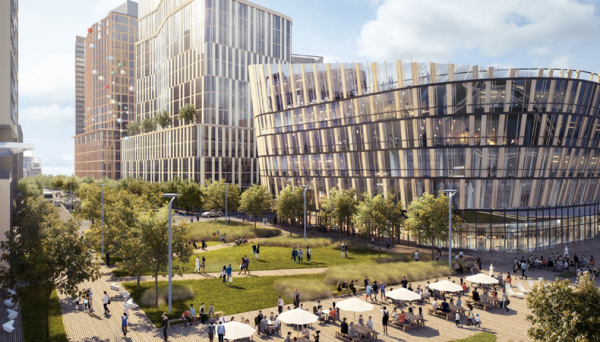March 16, 2022

Dorchester Bay City as seen in a rendering. Courtesy BPDA
The biotech industry is, by all measures, one of the fastest growing and most successful sectors in the Commonwealth. But here’s something that isn’t growing fast enough: the representation of people of color among the biologists, computer scientists, and engineers who fuel the field. While Black people represent 13 percent of the US population, they are only seven percent of the biotech workforce; Hispanics now compose 18 percent of the country’s people, but only six percent of the workers in biotech.
For Black and Brown students, opening that gateway is particularly important. Income inequality by race is growing by leaps and bounds. These gaps will not be closed until we ease the pathway to the jobs that promise high wages, job ladders that bring people of color into management, and – beyond money — careers that offer the satisfaction of doing good while doing well. Surely this describes the vast array of companies in our region that are based in the fields of science, technology, engineering, and mathematics (STEM).
There is something we can do to open these options faster: enable Dorchester Bay City to surge ahead and build a robust, ecologically sound, science park less than a mile from the majority-minority campus of the University of Massachusetts Boston.
Some 3,000 students are enrolled in UMass Boston’s College of Science and Mathematics, where they major in Biology, Chemistry, Physics, Computer Science, and related fields. This is the labor force of the future, and it looks like America itself.
But for these talented STEM students to find their way into the heart of bio-science companies, they need experience. Such involvement must come from firms they can get to easily, companies that can open their doors to interns, co-op placements, and part-time jobs that are compatible with full-time study. Most UMass Boston students don’t have the luxury of attending school without working at the same time. They have to earn enough money to pay for their college education and support their families. This is a fact of life for them.
If UMass Boston students are able to integrate their professional ambitions into their lives as students, they will speed toward the opportunities that biotech offers. Students are advantaged when their universities integrate experiential learning into their degree programs. And the closer those opportunities are, the more compatible they are with the life of the classroom and research lab that prepare students to be productive colleagues in STEM fields. The sooner Dorchester Bay City starts attracting large firms and startups, the sooner UMass Boston’s students of color will begin to populate this industry.
We know this works because we have seen the explosive takeoff of science parks surrounding other universities. Twenty-five years ago, the Georgia Institute of Technology — a public university in Atlanta — was an island unto itself, full of engineering students and faculty with all kinds of capabilities but little industry nearby. Today, Georgia Tech is surrounded by mixed use science parks and innovation districts with residential units, ground floor retail/commercial space, office, research, and development for both industrial and academic uses. This focus on industrial engagement has been an essential element of Georgia Tech’s meteoric rise in sponsored research from $186 million to $1.2 billion. This has attracted notable global companies like NCR, AT&T, Emerson, Honeywell, Boeing, Accenture, Siemens, and countless startups that benefit from the innovative, diverse, and inclusive campus culture and talent.
These companies sponsor meaningful internships, co-ops, and part-time employment during their academic years, providing career-building experiences, early professional development, and critical income to sustain their education. Those students go on to high-paying technical careers, often in the firms where they worked part-time during their academic years. Faculty have seen investment in their labs and industry-based sabbaticals that keep them at the forefront of their fields. These are the kinds of opportunities that will be open to UMass Boston when Dorchester Bay City starts sprouting STEM-based industries next door.
Dorchester Bay City is the leading opportunity for long-term racial and class integration of biotech due to its proximity to UMass Boston, the most diverse research university in New England and the third most diverse university in the United States. The companies attracted to the neighborhood will find a wealth of talent and the chance of a lifetime to make good on their intentions to recruit and retain a scientific/technical workforce that befits the Commonwealth.
Katherine S. Newman is the System Chancellor for Academic Programs of the University of Massachusetts and served as Interim Chancellor of the UMass Boston campus from 2018-2020. Carl Rust is the inaugural executive director of Industry Engagement at the University of Massachusetts who has served for 25 years in various industry engagement leadership positions at Georgia Tech.


